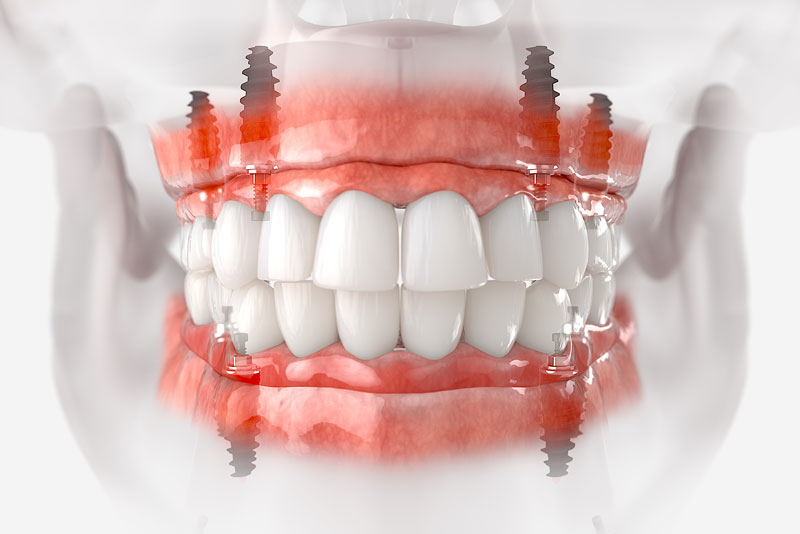When considering full mouth dental implants in Coventry, RI, one of the most critical preparatory steps is determining whether tooth extractions are necessary. Many patients with damaged, decayed, or unsalvageable teeth find that extractions provide a clean and healthy foundation for successful implant placement. At Eric George DMD & Associates, Dr. Eric George and his skilled team begin this journey with a thorough evaluation of your dental health during an initial consultation. This evaluation includes detailed imaging and assessments to create a treatment plan tailored to your unique needs.
Removing compromised teeth before implant placement is crucial to ensure the implants are stable and long-lasting. Retaining teeth with significant decay or damage can increase the risk of infections, gum disease, or bone loss, all of which can jeopardize implant success. Dr. George’s expertise ensures that each step of your implant process is optimized for the best possible outcome. His meticulous approach minimizes risks, enhances the longevity of the implants, and sets the foundation for a healthier, more confident smile.
Understanding the Full Mouth Dental Implant Process
Full mouth dental implants offer a transformative solution for individuals dealing with significant tooth loss. This advanced procedure provides a durable and aesthetically pleasing alternative to traditional dentures, improving both functionality and confidence. While the process is multi-staged to ensure a solid foundation for your new teeth, each phase is essential for achieving a natural and lasting result. Below is an in-depth look at the key stages:
1. Initial Consultation and Comprehensive Planning
Your journey begins with a thorough consultation and diagnostic evaluation. During this visit, Dr. George will assess the health of your teeth, gums, and jawbone through physical exams and imaging techniques like X-rays or CT scans. These tools offer a detailed view of your jaw structure, helping identify any preparatory treatments that might be necessary, such as:
- Bone grafts: To rebuild insufficient jawbone tissue and provide a solid base for implants.
- Sinus lifts: To increase bone height in the upper jaw when the sinus cavity is too close to the implant site.
Dr. George uses these findings to craft a customized treatment plan designed to address your specific oral health needs and cosmetic goals.
2. Tooth Extractions (If Necessary)
If tooth extractions are required, they are performed with precision to ensure a clean slate for the implants. Removing decayed or damaged teeth reduces the risk of infection and ensures that the jawbone and gums are healthy enough to support the implants. Depending on your unique situation, these extractions may be followed by additional preparatory procedures like bone grafting.
3. Implant Placement Surgery
The next step is the surgical placement of titanium posts into the jawbone. These posts act as artificial tooth roots and are the foundation for your new teeth. Titanium is a biocompatible material, meaning it integrates naturally with the jawbone through a process called osseointegration, ensuring the stability and durability of the implants. This stage requires precise placement to ensure optimal comfort, functionality, and aesthetics.
4. Healing and Osseointegration
Following implant placement, the healing phase allows the bone to fuse with the titanium posts. This process, known as osseointegration, is critical for creating a secure foundation for your new teeth. While healing times vary, this phase typically lasts several months. Though it requires patience, the result is unmatched stability and strength.
5. Abutment Placement
Once osseointegration is complete, abutments are attached to the implants. These small connector pieces extend above the gumline and serve as the anchor points for the prosthetic teeth. The placement of abutments is straightforward but plays a vital role in ensuring the crowns or full-arch prosthetics fit seamlessly and function correctly.
6. Final Prosthetic Placement
The final step is the creation and fitting of your custom-made crowns or full-arch prosthetics. Designed to match the color, size, and shape of your natural teeth, these prosthetics restore your smile’s appearance and functionality. Once in place, you’ll be able to eat, speak, and smile with confidence.
Post-Implant Care: Ensuring Long-Term Success
The success of your full mouth dental implants depends on diligent aftercare and routine maintenance. Dr. George provides detailed instructions to ensure your implants remain healthy and functional. Some key care tips include:
- Daily Oral Hygiene: Brush and floss your implants just like natural teeth to prevent plaque buildup and gum disease.
- Routine Dental Visits: Regular check-ups allow Dr. George to monitor your implants, gums, and overall oral health.
- Protective Measures: Avoid chewing on hard objects or using your teeth as tools, which can damage the prosthetics or implants.
Patients who follow these guidelines often enjoy the benefits of their implants for decades.
Why Choose Eric George DMD & Associates for Full Mouth Dental Implants?
Selecting the right dental team is essential for the success of your full mouth dental implant procedure. At Eric George DMD & Associates, Dr. George combines years of experience with cutting-edge technology to deliver outstanding results. Known for his meticulous attention to detail and patient-centered approach, Dr. George ensures every patient feels informed, comfortable, and supported throughout their implant journey.
What sets Eric George DMD & Associates apart is their commitment to excellence at every stage:
- Advanced Technology: State-of-the-art imaging and planning tools for precise diagnostics.
- Comprehensive Care: From tooth extractions to final prosthetic placement, every step is handled with expertise.
- Patient Comfort: A focus on open communication and individualized care ensures a stress-free experience.


